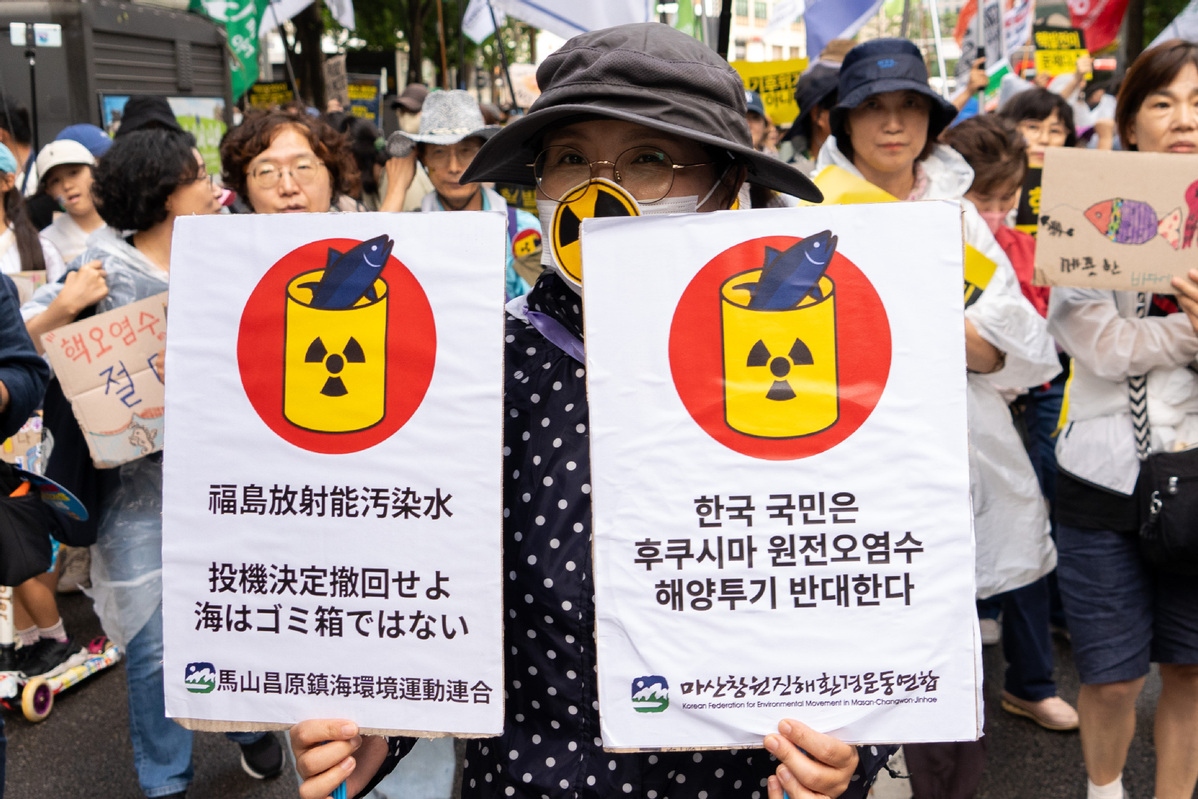
Big data analyses by the Belt and Road Research Institute of Hainan University show a difference in the opinions of the Japanese government and people in many countries on Tokyo dumping the nuclear-contaminated water from the damaged Fukushima Daiichi Nuclear Power Plant into the sea.
Less than 7 percent of the international community supports Japan's decision to release the radioactive water into the sea. In Japan, too, most of the people are opposed to it. Even in the United States, Japan's close ally, people are at odds with the Joe Biden administration's stance, with only 2 percent being in favor of Japan's ocean-contaminating act. Indeed, many have questioned the US administration's hypocritical stance of finding faults with almost every environmental protection policy of China while turning a blind eye to Japan's environmentally destructive act.
As for Western media outlets, quite a few of them have focused on China's opposition to Japan's action, instead of questioning the Japanese government why it is going ahead with its disastrous plan despite the strong opposition from home and abroad.
Searches for "Fukushima water", "Fukushima water release", "Fukushima wastewater", "radioactive water" and "nuclear water" on Google Trends and media database, combining AI analysis, show that about 68 percent of the people around the world hold a neutral or ambiguous view, 6.3 percent support, and more than 23 percent oppose Japan's discharge plan.
In Japan, about 22 percent of the people are opposed to the move while 19 percent support it. A big data analysis of news reports and social media posts shows that opposition parties, environmental organizations and fishing associations have condemned the Japanese government's decision, saying that it has ignored environmental safety and health of the people in Japan and the rest of the world, not made enough efforts to neutralize the meltdown effects of the nuclear reactors at Fukushima since 2011, and damaged the country's image and Fukushima's local economy.
The analysis of the Google Trend results also shows people in US western coastal states such as Oregon, California and Washington are worried about the effects of radioactive water.
The damage the radioactive water would cause to the marine ecosystem has also left Asia-Pacific countries extremely worried, with many of them opposing Japan's move. But the governments of the US, Australia and some other countries have ignored the public opinion at home to acquiesce Japan's plan out of geopolitical and ideological considerations.
First, to guard against the potential disastrous effects of the radioactive water, the Chinese mainland and the Hong Kong Special Administrative Region should more strictly regulate and test food, especially seafood, imports from Japan. In particular, Hong Kong should tighten its testing and regulation, because it has been the largest food export market for Japan for the past 16 years and accounts for about 23 percent of Japan's agricultural exports, in order to safeguard the health of Hong Kong residents.
Second, people should consider stopping eating and buying Japanese products so that Japanese businesses suffer losses and put pressure on the Japanese government to change its radioactive water discharge plan. Since the Japanese business community voted for the current Japanese government, they have the right to question it for taking decisions which harm their interests.
Third, people should mobilize global organizations and NGOs and civil society to put pressure on Japan to change its decision. And environmental organizations across the world should form an international coalition to collect public opinion globally to oppose Japan's environmentally devastating plan.
And fourth, China should consider declaring Aug 24 as "marine environmental disaster day", as Japan began dumping the radioactive water into the sea on Aug 24, 2023, despite strong doubts over the effectiveness of its mechanism for treating the toxic water and ignoring the global opposition to its decision. The Japanese government has set a dangerous example of putting its own interests above the well-being of the people in Japan and beyond.
Life on Earth depends on the oceans. By dumping the nuclear-contaminated water into the sea for the next 30 years, Japan could pose a serious threat to marine life and turn the oceans toxic, affecting the balance of nature. The international community should unite to stop Japan from doing that.
By Liang Haiming/Shi Xufeng
Liang Haiming is the dean and Shi Xufeng is the deputy dean of the Belt and Road Research Institute, Hainan University.
The views don't necessarily represent those of Finet.
财华网所刊载内容之知识产权为财华网及相关权利人专属所有或持有。未经许可,禁止进行转载、摘编、复制及建立镜像等任何使用。
如有意愿转载,请发邮件至content@finet.com.hk,获得书面确认及授权后,方可转载。
更多精彩内容,请登陆
财华香港网(https://www.finet.hk/)
财华智库网(https://www.finet.com.cn)
现代电视(http://www.fintv.hk)